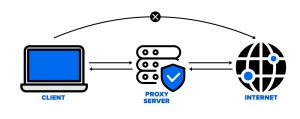In the rapidly evolving digital landscape, the relevance of proxies remains significant. Businesses and individuals alike continue to leverage proxies for a myriad of purposes, ranging from enhancing security to accessing geo-restricted content. This article delves into the current state of proxy usage, examining its applications, benefits, and considerations.
Understanding Proxies
A proxy server acts as an intermediary between a user's device and the internet. It requests resources on behalf of the user, concealing the user's real IP address, which can help with anonymity and security.
The Role of Proxies Today
In today's digital age, proxies play a pivotal role in various sectors. Companies use proxies to secure their internal networks and monitor employee internet usage. Marketers utilize them for SEO monitoring and ad verification, ensuring ads appear correctly in different regions. Moreover, proxies are crucial for web scraping, allowing data analysts to gather vast amounts of information without being blocked.
Types of Proxies
- Residential Proxies: These proxies are linked to a physical location, offering high anonymity and minimizing the risk of being detected or blocked.
- Datacenter Proxies: Located in data centers, these proxies provide high speed and efficiency, ideal for tasks requiring fast response times.
- Mobile Proxies: These are assigned from mobile carriers and are highly effective in applications where mobile IP addresses are essential, such as social media management.
Advantages of Using Proxies
Proxies offer numerous benefits that make them indispensable tools in certain contexts:
- Enhanced Security: By masking the user's IP address, proxies protect against external threats and reduce the risk of data breaches.
- Access to Geo-restricted Content: Proxies enable users to bypass geographical restrictions, accessing content from anywhere in the world.
- Improved Speed and Bandwidth Savings: Caching capabilities of proxies can lead to faster load times and reduced bandwidth consumption.
Choosing the Right Proxy
Selecting the appropriate proxy involves considering several factors, including purpose, budget, and required specifications. For instance, residential proxies might be preferable for tasks that require a high level of anonymity, but they can come at a higher cost compared to datacenter proxies. Efficiency and speed are paramount for activities like web scraping, making datacenter proxies a more cost-effective choice.

Cost Considerations
The cost of proxies can vary widely based on type, quality, and provider. Residential proxies typically range from $5 to $20 per GB, depending on the provider and package. Datacenter proxies, on the other hand, might offer unlimited bandwidth at a fixed monthly rate, providing a more budget-friendly option for high-volume users.
Efficiency and Performance
When evaluating proxies, speed is a crucial factor. Datacenter proxies offer superior speed and stability, making them suitable for tasks requiring quick response times. However, for applications where detection avoidance is key, residential proxies, despite being slower, provide the advantage of appearing as regular user traffic.
Conclusion
Proxy continue to be a vital component of the digital toolkit for many users and organizations. Whether for security, privacy, or accessing restricted content, the utility of proxies is undeniable. By carefully selecting the right type of proxy, users can achieve their objectives efficiently and cost-effectively. For those looking to purchase reliable proxies, LunaProxy offers a wide range of options to meet various needs and requirements.
Understanding the intricacies of proxies and their applications can significantly benefit individuals and businesses, enabling them to navigate the digital world more securely and efficiently.
